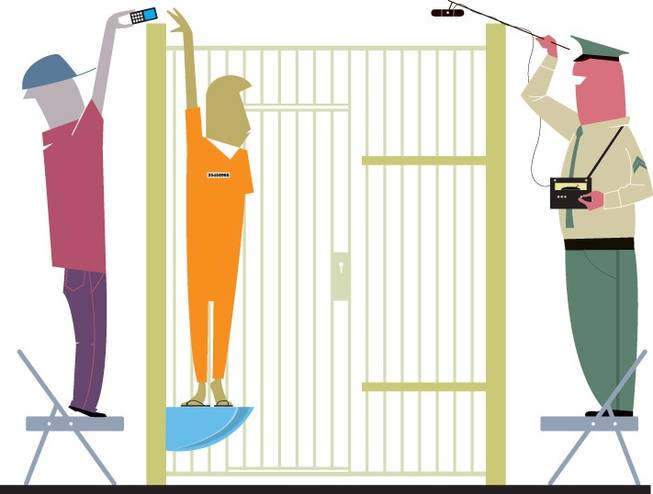Friday, Dec. 17, 2010 | 2 a.m.

Howard Skolnik
Nevada prison officials are joining colleagues nationwide in a crackdown on what they say is widespread illegal cell phone use among inmates.
The Nevada Corrections Department wants the 2011 Legislature to allow the state prisons — with a judge’s approval — to trace telephone calls to detect and confiscate cell phones smuggled to inmates.
Department Director Howard Skolnik, who is retiring at the end of this month, said the legislation is needed because inmates can use the phones to plot escapes, create disruptions in prison or coordinate other criminal activities with street gangs.
“We don’t have the authority to track cell phones, which is becoming an increasing problem in the prisons,” Skolnik said. “We have not confiscated that many, and that’s a concern.”
Although his department doesn’t count the cell phones that are confiscated, California does and the confiscations there are increasing. The Los Angeles Times reported this month that prison officials have taken more than 8,600 cell phones this year, and that notorious Charles Manson was caught with one under his mattress.
Authorities in Georgia on Monday locked down four prisons after inmates used contraband cell phones to rally for better work and living conditions.
“This problem has reached everybody’s radar within the past few years,” Skolnik said. “It’s a national problem, but we’re not allowed to block cell phone calls under a 1934 Federal Communications Commission law.”
The law, the Communications Act of 1934, established the FCC as the regulatory authority over telephone service nationwide. The FCC views cell phone use as a valuable form of communication for businesses and individuals that should be protected from jamming.
Concern over cell phones prompted Skolnik’s department to train a dog to sniff out the mobile devices starting early next year.
What prompted Skolnik’s worries and embarrassed his department occurred in August 2005 when Jody Thompson, who was serving time for kidnapping, robbery with a deadly weapon and burglary, escaped from Northern Nevada Correctional Center in Carson City in a delivery truck.
He planned his escape with a cell phone provided by a dental assistant and love interest who worked at the prison. Thompson contacted a friend, who picked him up in Silver Springs, east of Reno.
While Thompson was on the run, law enforcement officials alleged that he committed robberies and other crimes that victimized 22 people. In one incident, the U.S. Marshals Service claims he made off with more than $18,000 in an armed robbery outside a Las Vegas bar. Authorities pursued him in a high-speed chase, and he crashed his vehicle. But the Marshals Service said he escaped on foot, committed an armed home invasion and stole another vehicle to elude capture. The Marshals Service and Metro Police caught him in Las Vegas that November, but not before he committed another armed robbery that netted more than $27,000, the Marshals Service said.
Thompson’s escapade prompted the 2007 Legislature to make it a felony for an inmate to possess a cell phone without authorization and a felony for the individual who furnished the phone or attempted to do so.
“His apprehension cost ... Nevada thousands of dollars and hundreds of man hours, which included assistance from the FBI, U.S. Marshals Service, state and local law enforcement from Pershing County to Nye County and every county in between,” Pamela Del Porto, a Corrections Department investigator, testified in 2007. “All this happened because of the compromise of one staff member who gave him one cell phone.”
The law has not reduced Skolnik’s fear that large numbers of cell phones are being smuggled in to prisons.
Assembly Bill 11 next year would add the department’s criminal investigators and inspector general to the list of peace officers who would be permitted to use phone tracing devices with court approval. That list includes police officers, investigators employed by the Nevada attorney general’s office, district attorneys and the Nevada Public Safety Department, along with state Gaming Control Board agents.
The bill also would add a prisoner’s escape to the crimes the Nevada attorney general’s office or a district attorney could pursue through the interception of oral or wire communications, again with a judge’s permission.
The legislation isn’t raising any immediate concerns from Allen Lichtenstein, attorney for the American Civil Liberties Union of Nevada.
“This still has to go through the proper due process,” he said. “It doesn’t seem to create any new constitutional violations.”
But former Nevada prison inmate John Witherow, who moved to Michigan after his Nov. 30 parole from crimes that included attempted robbery and a prior parole violation, said the cell phone issue is overblown. Witherow alleges in an ongoing federal lawsuit that prison employees listened in on phone conversations he had with an attorney — allegations the Corrections Department denied. He said the only time he knew of inmates with cell phones was when he or others were in cells where their phone privileges were restricted, necessitating cell phones use authorized by prison officials.
“I was in the prison system for 25 years and I never saw one, except for the ones guards handed me when I was in lockdown,” he said. “There may have been one or two people who smuggled in cell phones but this is a lot to do about nothing.”
A much different picture has been painted in Congress, which approved a bill in July prohibiting inmates from using cell phones in federal prisons. The bill, signed in August by President Barack Obama, states that anyone caught trying to give a cell phone to a federal inmate could get up to a year in prison.
A separate bill, the Safe Prisons Communications Act, would allow state and federal prisons to apply to the FCC for permission to jam cell phone signals in correctional facilities. The legislation, which passed the Senate in October 2009, was prompted by a Texas death row inmate who used a smuggled cell phone to threaten a state senator. Authorities found 11 other cell phones on death row.
Companion legislation was introduced in the House by Rep. Kevin Brady, R-Texas, who said last year: “It is unacceptable that these inmates have been able to threaten people from behind bars, and it must not continue.”
But the bill didn’t survive the House Subcommittee on Crime, Terrorism and Homeland Security and is dead for this session. Brady’s spokeswoman, Tracee Evans, said it is likely the bill will be introduced next year because “the Texas prisons want it.”


Join the Discussion:
Check this out for a full explanation of our conversion to the LiveFyre commenting system and instructions on how to sign up for an account.
Full comments policy